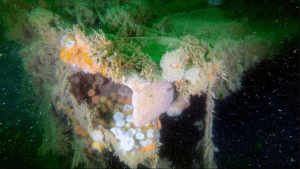
Have you ever been intrigued by the idea of using a magnet to fish for treasures in rivers and lakes? It sounds like a fun and innocent adventure, right? Well, it turns out that this popular hobby, known as magnet fishing, has been deemed illegal in various places. But why? What could possibly be wrong with using a simple magnet to explore underwater mysteries? In this article, we’ll unravel the hidden dangers behind the ban on magnet fishing, helping you understand the surprising reasons authorities are putting the brakes on this seemingly harmless pastime. So, let’s dive in and discover why the joy of magnet fishing comes with some unexpected challenges.
Environmental Impact.🐟
Exploring the secrets of the ocean depths has always captivated our imagination. Magnet fishing, a seemingly innocent adventure, promises to unveil the hidden treasures submerged beneath the water’s surface. However, as we embark on this underwater journey, it’s essential to understand the environmental impact that comes with it, and why, surprisingly, it has led to the question: why is magnet fishing illegal?
Disturbing Aquatic Homes:
When we toss our magnets into the water, eager to pull up forgotten relics, we may not realize the potential harm we’re causing. The strong magnets, like underwater treasure hunters, have the power to disturb the peaceful homes of marine life. Imagine your cozy space suddenly disrupted – it’s the same for fish, turtles, and other aquatic creatures. This disturbance can have far-reaching consequences on their habitats, affecting their ability to thrive in the underwater world.
Risk to Sensitive Ecosystems:
Picture a delicate web where every living being plays a crucial role – that’s our aquatic ecosystem. The strong attraction of magnets to metal objects poses a dual threat. Not only does it draw up discarded items from the depths, but it also brings along the potential to disrupt the balance of this delicate ecosystem. Sensitive underwater environments are at risk, and the consequences can be severe for the varied life forms that call the waters home.
Endangering Aquatic Species:
As we eagerly seek treasures, we might inadvertently endanger the very species we aim to marvel at. The risk of disrupting ecosystems extends to the endangerment of aquatic species. From tiny organisms to larger marine life, the consequences of magnet fishing ripple through the underwater community. Environmental agencies, vigilant guardians of our aquatic environments, have swiftly labeled magnet fishing as an activity carrying potential long-term consequences for aquatic biodiversity.
Safety Concerns.🐟
The enchantment of uncovering hidden treasures beneath the water’s surface often blinds us to the potential dangers that lurk in the depths. As we delve into the safety concerns surrounding magnet fishing – a pursuit that prompts the query: why is magnet fishing illegal? – it becomes evident that beneath the shimmering allure lies a realm of risks, some as sharp as the metal objects we seek.
Unseen Hazards of the Deep:
The magnetic pull that draws up artifacts from the underwater world may also unveil hazards hidden from sight. Imagine the surprise of pulling up a relic, only to discover an unexploded ordnance, a forgotten weapon, or a sharp object waiting to greet you. These concealed dangers, remnants of a bygone era or perhaps the result of human carelessness, add a layer of risk to the magnetic adventure.
The Sting of Accidental Injuries:
The thrill of the hunt can quickly turn into an unexpected journey to the emergency room. Accidental injuries related to magnet fishing incidents are more common than one might think. A seemingly harmless activity becomes perilous when hooks, heavy objects, or sharp items are pulled from the depths. These injuries, ranging from minor cuts to more severe wounds, have prompted authorities to raise a flag of concern, leading to the question of why is magnet fishing illegal in various regions.
Spearfishing Guns and Unseen Threats:
In the pursuit of hidden treasures, magnet fishing enthusiasts may unintentionally stumble upon more than rusty relics. The underwater world conceals not only metal objects but also the potential for encountering spearfishing guns or other discarded weaponry. This unforeseen danger amplifies the safety risks associated with magnet fishing, emphasizing the need for caution and awareness beneath the water’s surface.
Legal Implications.🐟
Embarking on the magnetic adventure of fishing for treasures beneath the waves brings not only the thrill of discovery but also a web of legal considerations. The pursuit of uncovering hidden treasures has led to the perplexing question: why is magnet fishing illegal? Delve into the legal implications surrounding this seemingly innocent activity, where the magnet’s pull may lead not only to artifacts but also to potential legal troubles.
The Unintended Consequences:
Magnet fishing, often driven by the allure of finding lost artifacts, takes a turn into murky waters when it comes to legal consequences. The magnetic pull may bring up various items, innocuous or otherwise, and this diversity raises eyebrows among legal authorities. The eclectic mix of finds introduces an element of uncertainty, as some items may be linked to criminal activities, turning a recreational pursuit into a potential legal quagmire.
Unveiling Criminal Connections:
As magnets latch onto hidden items beneath the water’s surface, there’s an inherent risk of unintentionally exposing connections to criminal activities. The underwater realm may harbor discarded evidence, forgotten objects, or items with a darker past. Authorities, mindful of the potential consequences, express concern that individuals engaging in this activity might unwittingly become inadvertent discoverers of evidence, stirring legal complexities that extend beyond the allure of underwater exploration.
Legal Safeguards and Prohibitions:
In response to these concerns, certain regions have taken a decisive stance by outlawing magnet fishing altogether. The goal is clear – to prevent interference with ongoing investigations and the mishandling of potential evidence. This legal prohibition seeks to strike a balance between the thrill of magnet fishing and the need to maintain the integrity of legal processes, emphasizing the importance of responsible exploration.
Curiosities about Black Sand Beaches: Unraveling Nature’s Mysteries
Amidst legal considerations, let’s take a brief pause to explore an intriguing side note related to magnet fishing. Did you know that some of the most captivating black sand beaches hold curiosities beneath their dark grains? These unique coastal wonders are not just about legalities; they also hide nature’s secrets, inviting us to marvel at the mysteries tucked away beneath the surface.
FAQs.
Is magnet fishing dangerous?
Magnet fishing can be dangerous due to the risk of encountering sharp or hazardous objects submerged in water. Safety precautions are crucial to minimize potential injuries.
Why is magnet fishing illegal in some places?
Magnet fishing is prohibited in certain regions due to concerns about its environmental impact, safety risks, and the potential interference with legal processes.
Can magnet fishing uncover illegal activities?
Yes, magnet fishing has the potential to uncover items linked to criminal activities, leading to legal implications for those involved. Authorities may outlaw the activity to prevent unintended interference with ongoing investigations.


